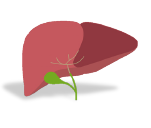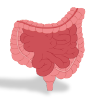Pathophysiology of primary bile acid synthesis disorders
Failure to synthesise normal bile acids reduces the flow of bile, causing cholestasis and the retention of potentially hepatoxic compounds – for example conjugated bilirubin – which are normally excreted in the bile.1 Normally, bile acids facilitate the detachment of γ-glutamyl-transpeptidase (GGT) from the canalicular membrane. This is why BASDs, unlike other causes of cholestasis, do not lead to elevation of plasma GGT.1 As taurine and glycine conjugates of cholic acid (CA) and chenodeoxycholic acid (CDCA) are required to facilitate emulsification and absorption of fats and fat-soluble vitamins, the absence of these bile acids can lead to steatorrhoea, failure to thrive and deficiencies of fat-soluble vitamins. 1
adapted from Jahnel 2017 2
Healthy hepatocyte
Cholesterol
Cholesterol
CYP7A1
CYP7A1
CYP727
CYP727
3β-HSD
Δ4-3-oxoR
3β-HSD
Δ4-3-oxoR
CA+CDCA
BSEP
Neutral
Pathway
Neutral
Pathway
FGFR4
FGFR4
FGF15/19
FGF15/19
Primary bile acids
Toxic bile acid intermediates
ASBT
Enterocyte
Urinary excretion
FGF15/19
FGF15/19
FXR
FXR
NTCP
NTCP
Acidic
Pathway
Acidic
Pathway
Bile acid intermediates
Absence of
primary bile acids
cholestatic
hepatotoxic
Hepatocyte with 3β-HSD
or Δ4-3-oxoR deficiency












1. Clayton PT. Disorders of bile acid synthesis. J Inherit Metab Dis 2011;34(3):593-604.
2. Jahnel J, Zöhrer E, Fischler B, et al. Attempt to determine the prevalence of two inborn errors of primary bile acid synthesis: results of a European survey. J Pediatr Gastroenterol Nutr 2017;64:864-68.
TH-BAS11EN/01/02/2024















